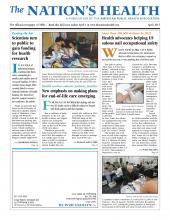Airport passenger screenings for infectious diseases still miss a significant chunk of sick travelers, according to a recent study.
Arrival screenings miss half to three-quarters of people with infections who complete their flights, according to a study published Feb. 19 in eLife.
“There has been a lot of literature coming from the scientific community that shows screening is not typically very effective,” said Katelyn Gostic, a study author and doctoral student at the University of California-Los Angeles’ Department of Ecology and Evolutionary Biology. “We wanted to do a study to analyze the effectiveness of a variety of pathogens and in different contexts so we can be proactive instead of reactive.”
Researchers looked at screening procedures for six pathogens linked to recent disease outbreaks: Ebola, H1N1 flu, H7N9 flu, Middle East respiratory syndrome and severe acute respiratory syndrome. The study evaluated how factors such as screening techniques and knowledge of exposure risk combine to influence airport screening.
Fever screening, for example, was the most effective tool for diseases that do not take long for symptoms to develop, such as the flu. However for diseases such as Ebola, which take longer to develop symptoms, the study said questionnaires were initially more effective than fever screening, as many people are still asymptomatic at the beginning of an outbreak.
Infrared scanners, which airport workers apply to a passenger’s forehead to find signs of fever, were 70 percent efficient on average, the study said.
Such screenings are important because no more than 25 percent of people report known exposure risks on passenger questionnaires before entering an airplane, the study estimated.
“The finding that honest reporting on these questionnaires is low is disconcerting not only because questionnaires are a way we can catch infections, but also because data from questionnaires can be used to follow up with travelers at risk of exposure,” Gostic told The Nation’s Health. “Adequate follow-up is good for at-risk individuals because it can connect them to appropriate care. Adequate follow-up is also good for public health because it facilitates a rapid response when imported cases do arise. But without honest self-reporting, adequate follow-up is impossible.”
Gostic said airport screenings should be looked at as something that can either reduce the number of imported diseases or delay them so public health workers have more time to respond to and prepare for more cases.
“I think that for the public health community, the main takeaway is that screening is costly and leads to a lot of inconvenience, so if we are going to implement these policies it’s important to maximize their benefits both in terms of case detection and data collection,” Gostic said. “Our study suggests ways screening could be tailored to specific outbreak scenarios.”
For more information, visit http://elifesciences.org/content/4/e05564.
- Copyright The Nation’s Health, American Public Health Association









